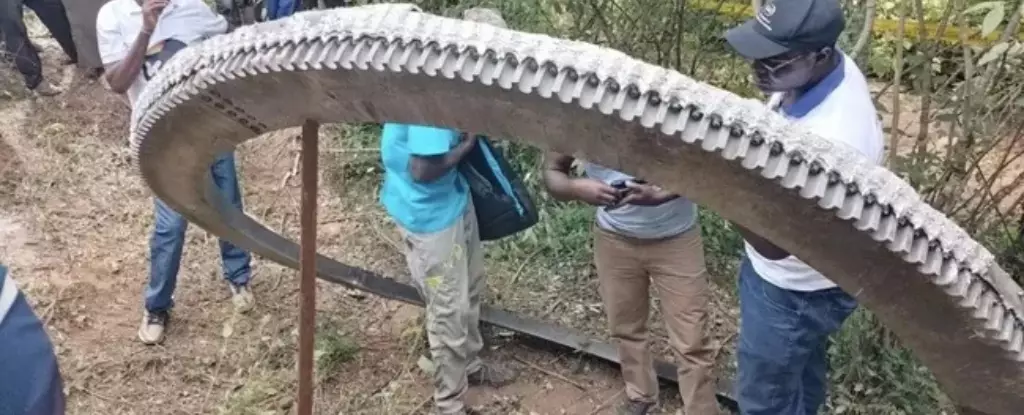On a seemingly ordinary Wednesday afternoon, the tranquility of Mukuku Village in Kenya was disrupted by an extraordinary event. Around 3 p.m. local time, a large metallic ring, weighing approximately 1,100 pounds and measuring eight feet in diameter, crash-landed in the village. The incident, as reported by the Kenya Space Agency, represents a significant moment not only for the local community but for humanity’s ongoing relationship with space exploration and the aftermath that comes from it. Thankfully, villagers were unharmed, and authorities swiftly assured the public that the debris posed no immediate danger.
Maj. Alois Were, an official with the Kenya Space Agency, provided insights to local media, suggesting that the unusual object could be a remnant of a rocket separation stage. This assertion opens a door to numerous questions regarding the origins of the ring and what it signifies about increasing space activities. The rapid advancement in technology has propelled humans into an era where more objects than ever are being launched into the cosmos, raising concerns about the inevitable consequences of such endeavors.
While the metallic artifact has drawn attention, it has also brought to light the fact that the identity of the rocket or mission from which it originated remains uncertain. As recoveries from the impact site commence, the Kenya Space Agency is tasked with not just determining the source of the debris but potentially holding the responsible parties accountable under international law. This highlights a critical void in global governance regarding the issue of space debris—a complex topic often overlooked in broader discussions about aerospace engineering and environmental concerns.
Calls for legal accountability are perhaps an urgent reminder of how interconnected our global community has become. In an era where space exploration is increasingly privatized, this incident poses questions surrounding liability and regulation. How do nations navigate the complex web of ownership in an era where multiple commercial entities are vying for positions in the cosmos?
The crash in Mukuku Village is not an isolated incident. There have been prior occurrences that remind us of the risks associated with space travel. For instance, in May 2024, a sizeable fragment of SpaceX debris landed in North Carolina, narrowly avoiding human casualties. Previous incidents involving debris from the International Space Station have compounded fears regarding our safety and the effects of increased human activity in space.
In fact, the accumulation of space junk extends beyond the occasional hazardous landing. Since the dawn of space launches, humanity has produced millions of fragments, from defunct satellites to microscopic pieces of debris, orbiting the Earth at alarming speeds. Reports indicate that operators of satellites receive an estimated 1,000 warnings daily about potential collisions, creating a precarious situation where a single significant event could lead to a catastrophic chain reaction—a phenomenon termed the Kessler Syndrome.
As we move into an era with record-breaking launch numbers—around 250 identified in 2024—these situations will become increasingly common. The challenge ahead is multi-faceted, spanning beyond the immediate concerns of safety. The risk of creating unmanageable space clutter is now juxtaposed with the benefits of technological advancements and international cooperation in space science.
The narrative that will shape our future is not merely about exploration; it also involves restraint and responsibility. Society must grapple with the ethics of space exploration, including the accountability mechanisms for those who contribute to space debris. Furthermore, international regulations must evolve to adequately address the implications of increased private space endeavors, ensuring that space remains a domain for exploration rather than a legacy of neglect and irresponsibility.
The unexpected landing of a piece of space junk in Mukuku Village serves as a cautionary tale about the perils associated with our increasingly ambitious aspirations in outer space. It underscores the urgent need for coherent strategies in space governance and a global dialogue about responsible exploration. Moving forward, humanity must foster a sense of stewardship for both our planet and the vast expanse above, ensuring that future generations are not left to navigate the dangers of a cluttered cosmos. As we look to space for answers and inspiration, let us also commit to accountability and sustainability, safeguarding this frontier for all who dare to dream.


Leave a Reply